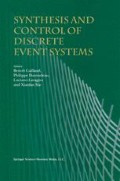Abstract
We present a modular formalism and methodology for modelling and control of discrete event systems, such as flexible manufacturing systems. The formalism is based on Petri net modules which communicate via signals. Two kinds of signals are employed, namely active signals, which force occurrence of (enabled) events (typically switches), and passive signals which enable/prohibit occurring of events (typically sensors). We motivate both kinds of signals, illustrate their using on several examples and discuss their relationships. Modelling with such modules appears to be very natural from engineering perspective, enables hierarchical structuring, and supports locality principle. We discuss concepts of equivalence between modules, which support interchanging of modules with the same signal environment (same functionality). Further, we discuss the role of both kinds of signals in control tasks and we focus on the control aspects in general.
supported by DFG: Project “SPECIMEN”
Access this chapter
Tax calculation will be finalised at checkout
Purchases are for personal use only
Preview
Unable to display preview. Download preview PDF.
References
J. Desel, G. Juhâs and R. Lorenz. Process Semantics and Process Equivalence of NCEM. In Proc 7. Workshop Algorithmen und Werkzeuge für Petrinetze AWPN 2000, Fachberichte Informatik Universität Koblenz–Landau, pages 7–12, October 2000.
H.-M. Hanisch, A. Luder und M. Rausch. Controller Synthesis for Net Condition/Event Systems with a Solution for Incomplete State Obersvation. European Journal of Control, 1997, 3, 280–291.
H-M. Hanisch and A. Luder. A Signal Extension for Petri nets and its Use in Controller Design. Fundamenta Informaticae, 41 (4) 2000, 415–431.
H.-M. Hanisch, J. Thieme und A. Luder. Towards a Synthesis Method for Distributed Safety controllers Based on Net Condition/Event Systems. Journal of Intelligent Manufacturing, 5, 1997, 8, 357–368.
L.E. Holloway, B.H. Krogh and A. Giva. A Survey of Petri Net Methods for Controlled Discrete Event Systems. Discrete Event Dynamic Systems: Theory and Applications, 7, 1997 ), 151–190.
R. S. Sreenivas and B. H. Krogh Petri Net Based Models for Condition/Event Systems. In Proceedings of 1991 American Control Conference, vol. 3, 2899–2904, Boston, MA, 1991.
P. H. Starke. Das Komponieren von Signal-Netz Systemen. In Proc 7. Workshop Algorithmen und Werkzeuge für Petrinetze AWPN 2000, Fachberichte Informatik Universität Koblenz–Landau, pages 1–6, October 2000.
M.C. Zhou und E. DiCesare. Petri Net Synthesis for Discrete Event Control of Manufacturing Systems. Kluwer Adacemic Publishers, Boston, MA, 1993.
Author information
Authors and Affiliations
Editor information
Editors and Affiliations
Rights and permissions
Copyright information
© 2002 Springer Science+Business Media Dordrecht
About this chapter
Cite this chapter
Juhás, G., Lorenz, R. (2002). Modelling with Petri Modules. In: Caillaud, B., Darondeau, P., Lavagno, L., Xie, X. (eds) Synthesis and Control of Discrete Event Systems. Springer, Boston, MA. https://doi.org/10.1007/978-1-4757-6656-1_8
Download citation
DOI: https://doi.org/10.1007/978-1-4757-6656-1_8
Publisher Name: Springer, Boston, MA
Print ISBN: 978-1-4419-4942-4
Online ISBN: 978-1-4757-6656-1
eBook Packages: Springer Book Archive

